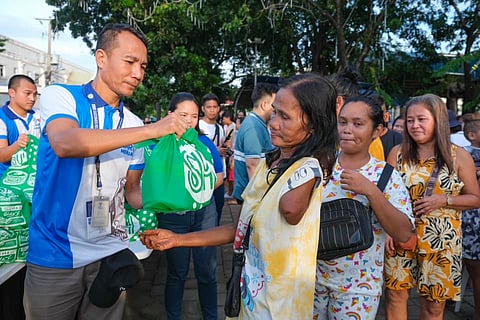
- NEWS
- the EDIT
- COMMENTARY
- BUSINESS
- LIFE
- SHOW
- ACTION
- GLOBAL GOALS
- SNAPS
- DYARYO TIRADA
- MORE

And just like that, we’re in the second month of 2025, counting the holidays again as we hurtle toward the end of another year before we even realize it. It’s a well-worn clich, but time really does fly.
Apart from the People Power Anniversary, February’s other widely celebrated “holiday” isn’t even official, yet we treat it as such anyway — and for good reason. Valentine’s Day may be overrated to some and an added shopping expense to others, but celebrating love is always worthwhile if we truly put our hearts into it (pun intended). In these times of widespread anxiety and uncertainty, the world could certainly use more love.
You may have heard that love can be expressed in different languages. The concept of the “love language,” first introduced by American author Gary Chapman in a book published in the 1990s and later popularized in the Internet age, refers to the way people prefer to give or receive love.
There are five love languages: words of affirmation — love expressed through spoken appreciation; quality time — giving undivided attention; receiving gifts — where objects carry effort and meaning; physical touch — which is self-explanatory; and acts of service — showing love and appreciation through actions.
In my view, acts of service are the primary love language of responsible businesses. Beyond profit and growth, the best companies are those committed to doing good. They recognize that their success is intertwined with the success of their key stakeholders: customers, employees, and the communities they serve. Therefore, it is only fitting that responsible businesses embed in their culture a commitment to giving back.
At my workplace (SM), “service” is not just an operative word but a core pillar anchoring our purpose. It is deeply embedded in our vision and mission, guided by our founder Henry Sy Sr.’s passion for delivering the best service possible in all his businesses.
The establishment of the SM Foundation in 1983 institutionalized his guiding principle of “people helping people.” Focusing on social inclusion in underserved communities where SM operates, the foundation has empowered thousands through its core advocacies in education, healthcare, farmer training, and disaster response and relief.
Recently, a major news channel interviewed SM Supermalls President Steven Tan on the retail industry’s performance in 2024 and its prospects for 2025. Beyond the numbers (SM malls registered double-digit growth, driven by resilient consumer spending despite economic challenges, Tan noted), what stood out was his observation on how malls have evolved from mere shopping destinations into active community hubs — even places of refuge.
Tan recalled how, in the wake of the recent strong typhoons, SM malls opened their parking spaces for free during severe flooding. They also welcomed stranded individuals into food courts, providing meals and charging stations for their smartphones. He was pleased to learn that other malls followed suit.
“It’s about helping the community we are in. It’s not just about business; it’s really about giving hope,” Tan said.
Acts of service. That, in my opinion, is the love language of good business.
(The author is a social development advocate and seasoned strategic business communicator. He is currently the vice president and head of corporate communications at SM Investments Corporation.)
